€l rnE woRlll cusToMs oRcANIzATIoN's ...
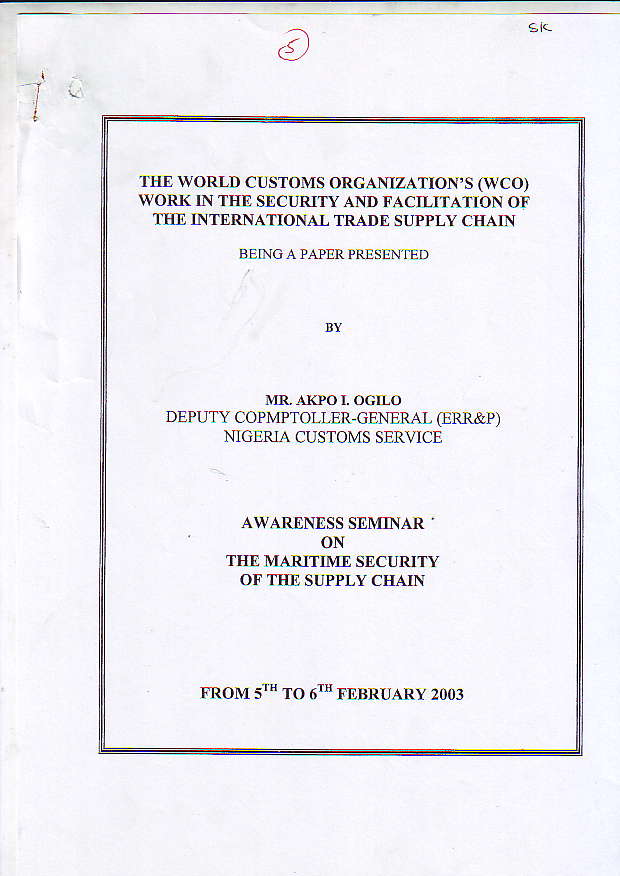
€l
rnE woRlll cusToMs
oRcANIzATIoN's
(wcot
WORK IN TIIN SICURITY AND FACILI'fA'IION OI'
:I'EE INTERNATIONAI TRADE SU?}LY CIIAiN
DEPUTYCOPMPTOI-I,TR
CFNERALGRR&P)
NIGEAj^ CUSTOMS
SIRVICE
AWAMNtrSS
'
StrMINAR
ON
TIII MARITTME SECURTTY
OF TIII1 SU??LY CSAIN
FROM 5IH Io bIqIIBI{L]ARY 2OO3
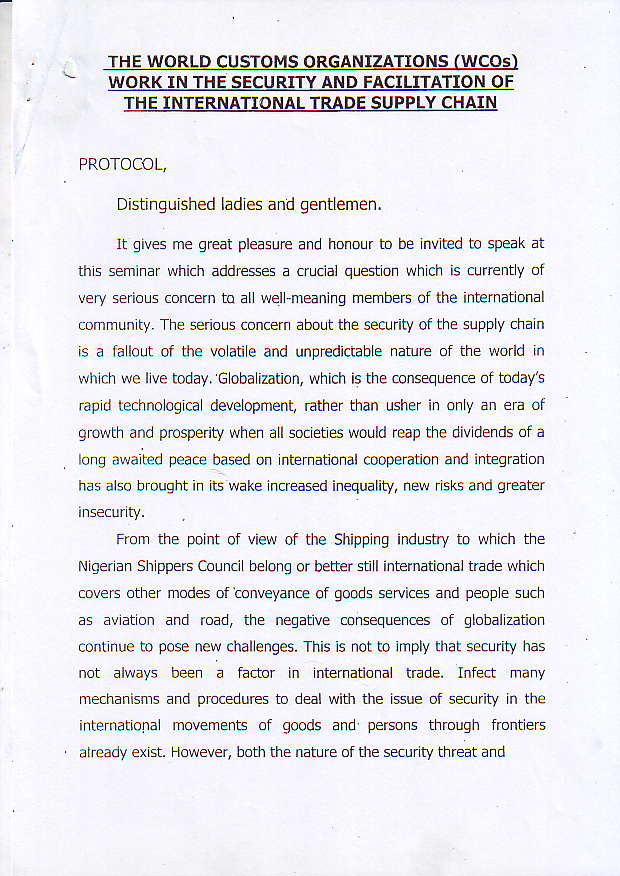
IHE WORLD
CUSTOMS
ORGANIZATIONS
(WCOS)
WORK IN THE SECURTTY
AND FACILITATION
OF
THE INTERNATIONAL
TRADE
SUPPLY
CHAIN
PPOTOCOL,
Disti.guished
ladies
and gentLemen,
It liv€s me qrear
pleasure
aid honour
to be nvlted
to speak
at
ihE semjnar
which
addreses
a.ruclalquestod
whch is curentY
ot
very serious.oncen
to al wel msnnq membe.s
ot the internatonal
.ommunlty.
Tlr€ sedous
con.e.n
aboutthesecuriq
oi th€ sLppLy
clran
is a ialout of the voatie and unFrcdiciabLe
nature
of tlre world in
wh ch we lve today,
Goba
iation, which
is the @nsequenc
of todays
rapld
technoog
ca deveLopnent,
€ther than usher
in on y an era of
g ol{th and pdsperity
when
a Isoceues
would
rop the divdends
of a
lon,l
awalLd
peace
based
on nternahonal
cooperatjon
and int€qraton
ha5
al5o
b ouqht
in ts wake ncr€a*d inequaliv,
new
fsks and
qreater
Ffom the pont oi view of tie shippng
indushy
to whi.h tlre
Niqeran
Sh
ppers
Colncl b€ onq or better
stj lintemationalnade
\\Nhiclr
covers
other
modes
of conveyance
olgoods
seruices
and peop
e such
as avaton and roadl tlre neqauve
consequencs
of qlobalation
cont.ue
to pose
ncw
chalene€s.
This
i5 not to inply thal secuary
has
not always been a factor in nternatjona trade. Infect many
mechanisms
and procedures
to deal witi lne $ue of se.uriv n the
intenariona
inovements
of qoods and peBons
tlrrcuqh
ironters
aleady
exist.
However,
both
the nature
of dE s{urty threat
and

importanty, the perception
of the natLre of that threat have
chanqed
d€matiG ly especially
sifce the teror st attack on the
wo.ld Trade centre in the united states on rlti september
2001, Effectively,
the focus has shifted from the relauvely
minor threat to trade (frcm theft, hljackings, tetrorjst
interuenUons,
etc) to the much hore aarmlng threat from
trade where terorists could Lse the mechanisds
and pro.esses
of trade as a weapon aoainst the developed
and indeed the
It is true that the nature and exterl of the thredt is only
stlll speculative
today, however its probability continues to
worry many .od.bies ard indeed internationa bodies and
organizations.
The fears ncude use ofthe internai
onar trade
supply chain to smLggle
weapons
of mass desftuction,
or th€
such weapons into target countrres
whe.e they dre detonated.
Amofg such concerned inter.ationa bodies and
orqani2ations currently addresslng the issue with the
seriousness
it desetues
are front ine $ade-reiated
o|9anizations
ncllding the Internationalf4aritime
Organization
(tt4o) and the
World Custons O1!anizatiof
(WCo).
This papef however focuses on some of the curfent
initatives of the World Customs
Orga.ization,
an independent
competent/
jntergovernmental
body with 161 membef customs
admifistrations accounting icr more than 97% oi a

However
Ln order
to underctand
and better
appreciate
the roe of the Word Customs
Organization
(WcO)
tn rhe
security
and facjlitatibn
of the internatonat
trade
suppty
cha
n,
It is import ntto take a close
took
atthe techntca
term in the
topic
olthis paper.vlz.
'Internationa
Suppty
Chai.,,.
The International
slpply Chain
is the tink that con.ects
every lacet involved
in qloba commerce.
It invorves
a
potentially
large number of activities
peforfired by a
considerable
number
of d fferent
parties.
An aclivity
may be
catried
out by difierent
panies
depending
on the rems of
blsness/
type of product
country
and rnarkel
etc. as wel as
on the methods
ol operation
of the buyef
aid setter.
rn ths
cont€xt/ the effeciive
and efficient
operanon
of a supply
ch.in
rs dependent
on how efficient
and etreciive
the reationships
and activities
in the supply
chaif are identified
and rjanaged.
m:rr.r o' bliv (a0) ot"rers.
Tlese,ord oe g,olpeo
r-.o
four m.rn calegores
viz.
(D
Suppljer;
(iD
(iiD
(iv)
Possible
playels
under
each
of
can be ldenUfied
as foLowsr
-

(a)
SLppller
(B)
(C)
Authoritv
- Chamber
of Cohmerce
- Nuclear/Atomtc
Energy
- Port Authority
- standardOrganis.tion
- sss
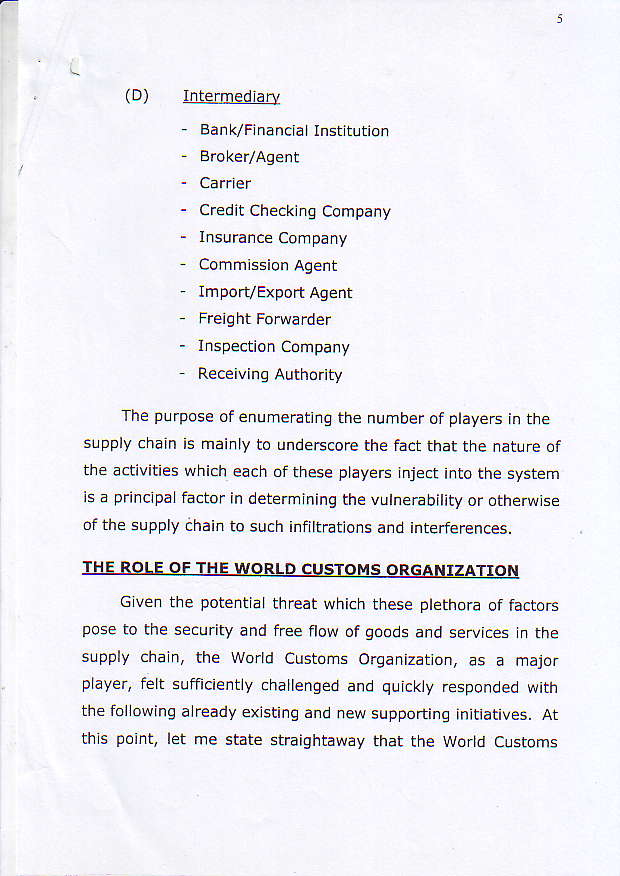
(D)
htermediatu
Bank/Flnancia
Insritution
- Credit CheckjnS
Compary
- Insurance
Company
Comfrission
Agent
Import/Export
Agenr
Freight
Forwarder
, rnspection
company
Receivinq
Authority
The pL.pose
ofenumeraung
the number
of ptayers
in the
s!ppry chain
is daifly to undeEcore
the ia.t that the fat!re of
the activities
which
each ofrhese
payers nject irto the system
is a principa
iactor in determining
rhe vutnerabitity
or otherwjse
ofthe supply
chain
to such i.tikratjons
and interierences.
THE ROLE OFTHE WORLD CUSTOMS
ORGANIZATION
Gven the potentia threat which these ptethora
of factoB
pose
to the security
and free flow of goods
afd services
n the
s-oplr -l-d 1 the wo d CJ(.or. Orga.ia 01. a> a -.rat
praye.,
relt sufticienuy
chattenged
and q!ickty responded
with
the iolowing
a ready
extsting
and new supportinq
initiatives.
At
thls point, let me state straightaway
that the world clstoms

organlzation aqrees with the obsetuation
that security a.d
tucilltation
are two s des ofthe same coln/ because
the efficient
and eifective customs procedures that address security
concerns
wi surely faciliiat€ Legitimat€ trade as well. In this
reqard/ the customs community has continled to make so id
prdgress. The ward custods organization aiso fully
recognlzes
that since security and laciitation are conmon
concerns rn today s highly gobaljzed word ecofomy, a
multilatera, strategic and collaborattve
partn€rship approach
wlth al stakeholde.s
is ofextr€me impoftance.
WCgIIIIIAIIYES
Reacting
to a call by the G8 sufrmit freetinq
in lune 2002
for a coope.ative
G8 Action
on TEnsport
Security,
the World
Customs Organjzatlon
at its June 2002 Council Sessions
prcmpty agreed on the Resolution
on Suppy Chain securiry
and trade faclitation. The body also eniered into intensive
cooperauon
with the International
r4aritime
orqrnizaron
(If4o)
on maritine securliy, resulting in the conc
usion ol a
Nlemorandum
of LJnderstanding
between
the two organizations
in luly 2002, Enharcing
the cooperative
ties with the
Internatjon! civll Aviauon
Organization
(ICAO) was another
very dpoftant prlority
area, In thls regard,
the Word Customs
Organizarlon
and Internatlon. Clvjl Aviation Orqa.lzation
agreed
to develop
a giobal standard
oi Advance
Passenqer
Inrormation
(API),
based
on the exrsting
wco/IATA
gurde
ines.
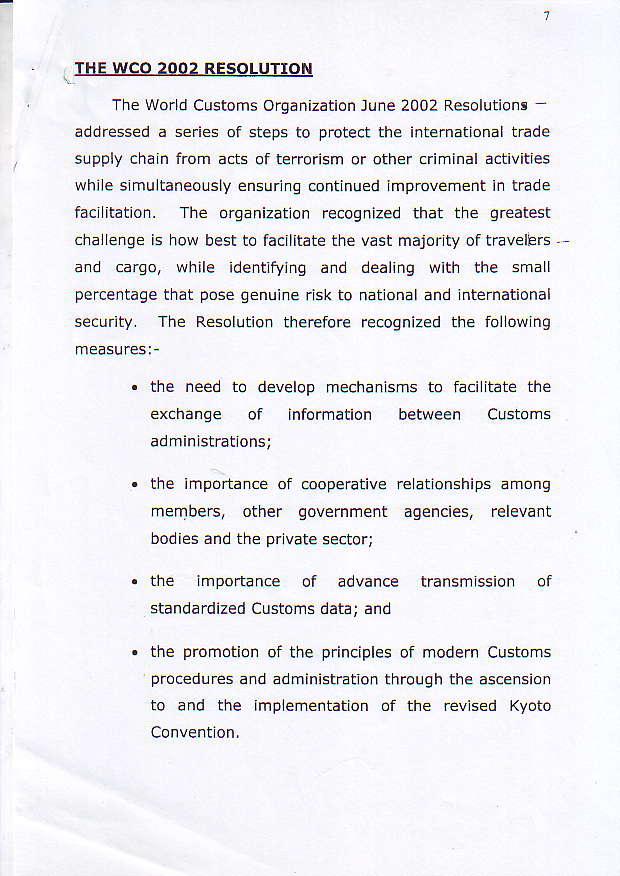
THE WCO 2OO2
RESOLUTION
The World Customs
Organization
Jlfe 2002 Resolutiont
addressed
a sedes of steps to prctect the international
trade
s!pply chain from acts of tetrorism or other criminal activities
whie slmu taneolsLy
ensurlnq
conrinued
improvement
in trade
laciitation. The orqanizauon
recognized
that the qreatest
chalenge is lrow best to facilitate
the vast majorty oi travelErs
and carqo, while idenufying and dealing with the smaLl
percentage
that pose genujre risk to natonal and lnternational
security. The Resolltion therefore recognized
the folowing
tlie need to develop mechaflsms
to faci itate the
exchance of information between customs
the lmportarce of @operative
r€atonships among
mernbe6, other government agencies/ relevant
the lmportance of advance
standardized
Custors data; a.d
the prcmotion of the principles
oi modern Customs
proced!res
and administratjon
ihrolqh the ascensiof
to and the impefrentation of the revlsed Kyoto

To give effect to the above heEsures
a Task Force
of
lclstoms experts was established
ro impLement
the fo owing
actions
based
on iisTerms ofReference:
'he C-nom! DoG l.4ode
to ene-re
thal it inc udes the essenual
data elements
to identify
. Developinq of glidelines for a lega and othef
p o edrrc basi. to erdblF 'c ddrcn.- p Fdroni'
transmission
of cusroms
data; and
Development
of guidelines
for cooperation
behveen
Clstoms and private
indlstry.
On the first measure,
theTask
Force
has atready
idenrified
twenty seven
(27) essential
data eLements
to crrssify
high risk
goods
for incluslon
in the Customs
Data Model,
T5p ddra eremer.. d€
nctuoeddrd cqre/torhspap6-.
It is very important to state here that the appllcatio. of
th€ Data Nlodel presupposes
the increasing
use of etecrronic
commerce
(e commerce)
in the hade suppy chEin.
Reporting
on the second assignment,
the Task Force
praposed
customs
Guideines
on Advanced
carqo tnformation
{ACI) and Advanc€d Passenger
l.rormatio. (ApD based
essentiaLly
on the revised
Kyoto
Convention.
Fo. a seamtess
trade
ftansaction,
the Task
Force
also
devetoped
other concepts
such as the Single
Window
(SW) and the Unique
Consigfmenr

Reference
(UcR). Whjle the former entails
an eectronlc
one
\\stap-shop
borde. management
that facl itates joint work n9
between
clstoms and other government
agencies,
the lalter ls
de.9r.d to e s.re ltdl .ccl co sgnrerr ras o L ,ou-
rererence
to enable authorities
to corftoL the whole ogistic
chaln, thereby
further promoting
security
and trade facilitation.
a.
.oro
"
ar, of lhF seo d
Force has come !p with a egd draft ol a mutlateral
instr!ment on lr4utual
admi.istrative assistafce based on trre
existing Nakobi convention
and a draft Guldelines
for .stional
leqislation.
apart from the multilateral
route, ther€ are a .eady
i. existence
eleven (11) Regional
lnte ligence Lialson Offices
(RILOS)
around the world whlch tunction as regional h!bs ror
i.tormation exchange.
s!ch information,
including
intelligence
ana ysesi is usua ly eectronically
transmitted
among member
Customs admlnistrations
by means of Customs Enforcement
On the thlrd Term of Reference,
the Task Force
is work nq
hzrd on the development of qujde ines on moperation
aqreehents usn9 existing materlals, such as rhe c TpAT
(clstoms
Tfade Partnershjp
Asainst Terrorism), reqonal
initiauves
ln the Asia-Pacific
Ecofomic
Caoperation
(APEC)
and
the European
communites (Ec), as we I as the private-sector
lnitiaUves slch as the Business Anti Smuggling Coa ition
(BASC).
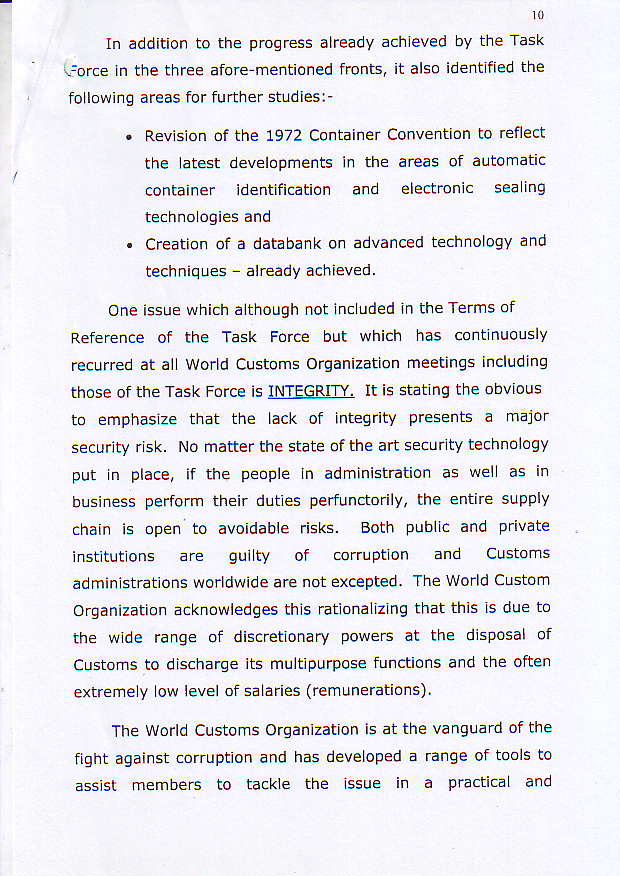
ln aoorhor
(o In- p oqr-ss a.reaoy
d(feved o/ e d r
!:orce Ln the three afore dentioned f@nts, it also identilied
the
fo lowing areas
ior furthef studlesl-
Revlslon
of the 1972 container
conventlon
to reflect
the atest developnents
in the areas of altomahc
contain€f identification and electronic sea ing
creation
of a databank
on advanced
t-'chnorogv
ano
techniqu€s already
achieved.
one issue
which
although
not ncuded
in theTerms
of
Reference
of the Task Force but which has conunuouslv
recured at al world customs
organization
meetinqs
i.clldinq
those
oftheTask Force
is INTEGRITY.
It is staUng
tlre nhvous
to emphaslze
that the Lack of integrlty presents
a m.jor
security
risk. No matter
the state
ofthe art securlty
technology
pur n place/ if the people ln administration
bLsiness
perform
their duues perfunctorily,
the entire supplv
chain is open to avoidable
risks. Both publi. and private
insutluons are gllty
of cotrlpuon and customs
adminlstrations
worldwide
are not excepted-
The world custom
o.qanization
u.knowledges
this rauonalizln9
that this is due to
the wlde ranqe of discretionary
powers at the disposal
of
customs
to discharge
jts multipurpose
functions
and ihe oiten
errrenely ow leve!
orsaLaries
(remuneratiois)
Th€ World
Clstoms
Orqanization
is at the vanglard
of the
fiqht against
cor.uption
and has deveLoped
a range
of toois to
asslst members to tackle the issue in a practiGL and

sustalnabl€ manner. These
included
the Arusha
and Mapuio
tcarations and the Model code of condlct The Arusha
declaratio.ls
now incorporated
ln the revlsed
Kyoto
cdnventron
- the principles
of simple, effecrive
and modern customs
The wond clstons orqanizEtion,
aware
that a chaif ls as
strong
as its weakest
link, tasked
the Task Force
to jdenufy
the
needs,
tools and resources
to develop
an appropnat€ capacrtv
buildlng
strategy
ior the customs
administrations
ol developrnq
and Least
developed
members
(the weakest
Links
if the suPplv
chain). Although
it ls a long term projed, it is aimed at
a eviating
the presumption
of such member
administrations
of
flrthef marginaLi2ation
Yoo will agree wiih me th't if this
capacity buildlng initiative is not senouslv tackled, the
industrialized
countnes
would have consciously
added
anotrer
''dlvjde' security
and trade faciLltation
divide"
to the akeady
existinq di9ita divide"
In conclusion,
it must be further emphasize'l
that the
wond customs
orqani2ation
and indeed
clstoms is onlv a part
orthe trade chain
and alone,
itcannot
overcome
the challenges
posed by rhe need to. securitv
and iacilitation
in the trade
suppy .hain, There is need for partnership
with fhe trade
commu.ity and all other stakeholdeB it is aga nst this
backdrop
that t on.e again
congratulate
the o.ganizers
of this
workshop.
Time is now ior dore of such
fora to be plr in pLace
a.d at.eguLar
lntervals
for that matter,
so that Nigeria
which
ls

definitely
a vital tink h the suppty
chain can reap maximum
L benefits
from today's
technotogy-driven
gtobat
connere.
Once
again,
thank
you foryourattention,

(}
.".""rif,lit
-.. *ifli:i;fj ".;t"#i."i:,"ii.,1;i:!
fi:flli*f
J:a
]I'*'-
i:;il11';f;i:ll .;'
i";:'
N,;;;;;:,
-
. d
ffi
hfi;i
:r; ft'ft;i;i,::ilt
t1:
:i; i;1i"lt:i;-li1,.xiilT:i
; i"igffLl:llli:li*it,*'**"
*'*'""",

;,.b.."lh"q.,''|
rh;$;
I
E F i "
::4._
|
d , L h * r d ! ' s d r i
I r d E y d ,
- a @ , f r t { F r i ! b r
I
E + o k /
l
oFi,
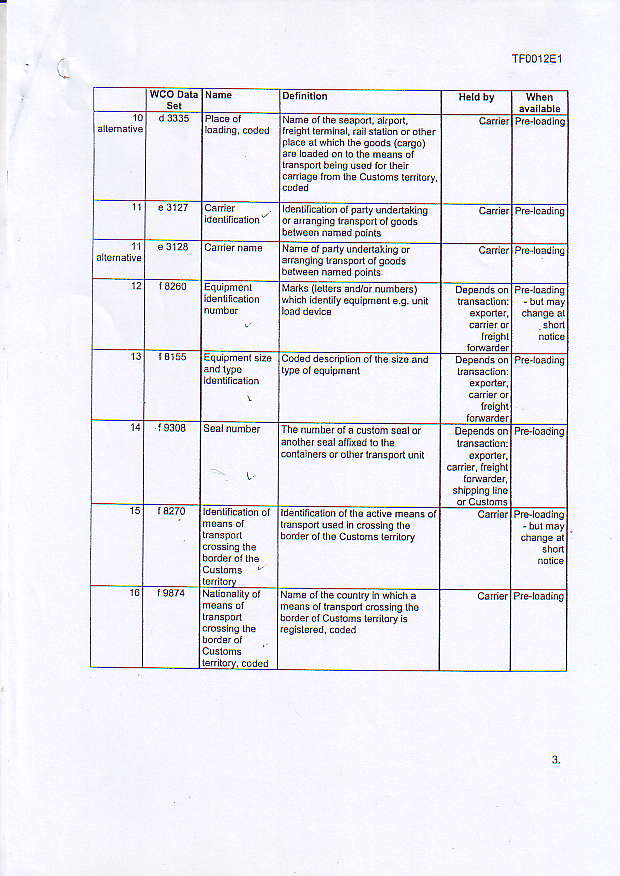

@
lii,!|lijsfuii,rni
$, sd
(;t o-1rt;4;i';i
h{hnii;rn;
@er lld*iercudeNeihe
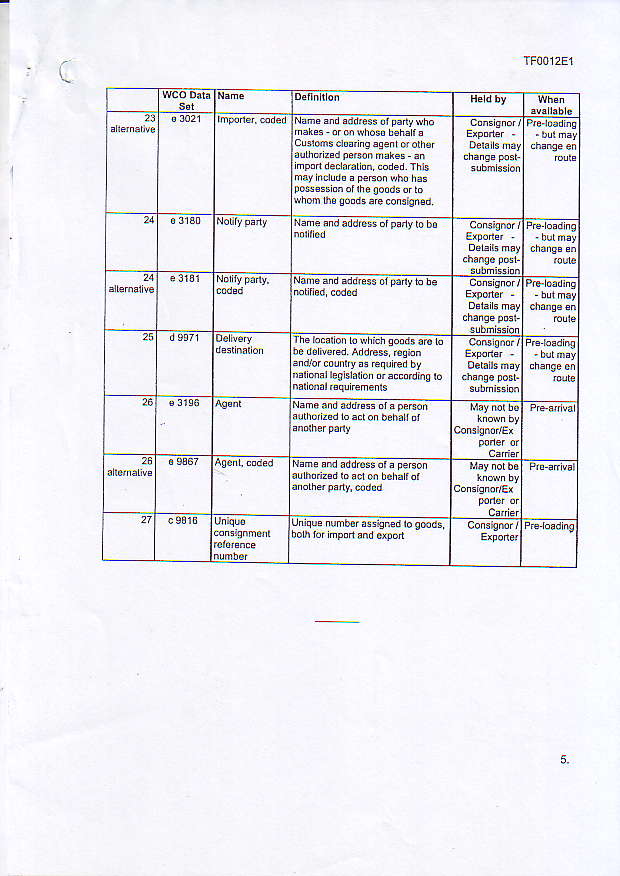
U 4
